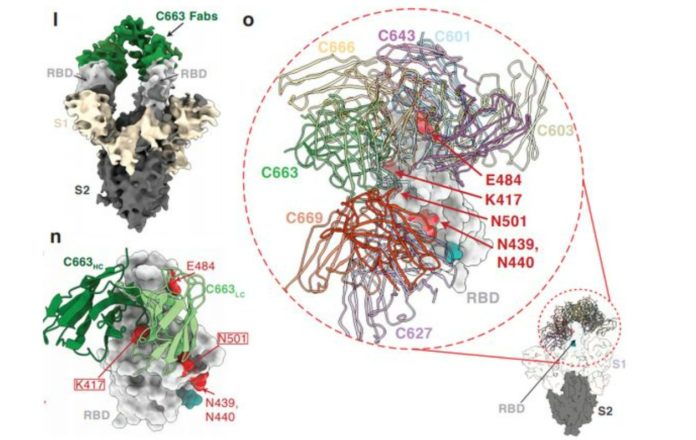A team of scientists from the United States have carefully studied the antibodies that are formed in humans in response to mRNA vaccines against coronavirus. They found that there are quite a few antibodies after vaccination, and they effectively neutralize the virus. However, several types of antibodies at once lose this ability to neutralize when the virus carries one of several mutations that are now spreading – for example, in Brazil and the UK. How much this will affect the effectiveness of vaccines is not yet clear.
In December, several countries began to vaccinate their populations against SARS-CoV-2. And at the same time, there were reports that in the world – for example, in the UK, South Africa and Brazil – new variants of the coronavirus are spreading, which may be more infectious than their predecessor.
It quickly became clear that mutations in these new variants affect the very region (receptor binding domain – RBD domain) of the viral S-protein, which helps the virus to enter the cell and which must be recognized by the antibodies of people who received the vaccine. However, to what extent these mutations will affect the effectiveness of vaccines, it was still not clear.
To understand this, Zijun Wang, along with colleagues from Rockefeller University in New York (all of them are not affiliated with the vaccine companies) collected blood samples from 20 people, of whom 6 received an mRNA vaccine from Pfizer and 14 from Moderna. All of them easily tolerated vaccination and did not have covid. The researchers measured the concentration of different types of antibodies in the blood of all 20 people to the S-protein in general and separately to its RBD domain. In all cases, type G immunoglobulins were expected to be higher than IgM and IgA. But since it is not yet known exactly what concentration can be considered “protective”, they can be compared only with the concentrations of antibodies in the blood of control people who were not ill – and all 20 people had more antibodies (p ≤ 0.0001).
- Scientists in Fear of This New Predator From Red Sea Eating Native Species in Mediterranean
- Does This Mean We Stopped Being Animal and Started Being Human Due to ‘Copy Paste’ Errors?
- The One Lifestyle Choice That Could Reduce Your Heart Disease Risk By More Than 22%
- Aging: This Is What Happens Inside Your Body Right After Exercise
- Immune-Boosting Drink that Mimics Fasting to Reduce Fat – Scientists ‘Were Surprised’ By New Findings
After that, the authors of the work checked how well antibodies from the blood plasma of vaccinated people neutralize the S-protein of the coronavirus, that is, prevent it from binding to cells and getting inside. They found that the neutralizing activity of antibodies did not differ depending on what kind of vaccine the person received, but in strength is similar to which occurs in people who have recovered a month after the illness.
The researchers then repeated the experiment with ten mutant viruses. Some of them carried the same mutations as the new variants of the virus: N501Y (it is found in the British version), K417N, E484K – or a combination of three mutations at the same time (as in the Brazilian version). They noticed that in three cases – against mutations E484K, N501Y, and a triple mutant – the neutralizing activity of blood plasma is 1-3 times lower. In other words, it is necessary to take 1-3 times more plasma with antibodies to achieve the usual result. Moreover, apparently, mutations interfere with the work of several key antibodies at once: when the authors of the work selected 17 antibodies most active against coronavirus from the plasma, it turned out that 9 of them become ten times less active against the E484K mutation, and another 5 and 4 – against mutations K417N and N501Y, respectively.
The authors of the work are in no hurry to draw loud conclusions about how these mutations can reduce the effectiveness of anti-coronavirus vaccines in general. While it is not known how many “working” antibodies are needed to protect the body from the virus, it is impossible to calculate how much decrease in their activity will be critical. Nevertheless, the researchers warn that mutations spreading around the world may not be harmless and slow down the emergence of herd immunity.
Most vaccine manufacturers have already announced that their development will be effective against new mutant variants. However, the official confirmation has so far been published only by specialists from BioNTech, who developed the Pfizer vaccine. They argue that the neutralizing activity of the antibodies the body produces in response to their vaccine is no different in relation to the “regular” coronavirus and the “British variant.” However, they also worked with a small sample of people (16 people) who received the vaccine just three weeks before the experiment. In addition, researchers from BioNTech did not test the plasma activity of those vaccinated against other variants of the virus.
One way or another, the final data on the effectiveness of vaccines can be obtained only when information appears about people who have contracted the coronavirus after vaccination – and it will be possible to calculate how many of them have caught which variant of the virus.
- Scientists in Fear of This New Predator From Red Sea Eating Native Species in Mediterranean
- Does This Mean We Stopped Being Animal and Started Being Human Due to ‘Copy Paste’ Errors?
- The One Lifestyle Choice That Could Reduce Your Heart Disease Risk By More Than 22%
- Aging: This Is What Happens Inside Your Body Right After Exercise
- Immune-Boosting Drink that Mimics Fasting to Reduce Fat – Scientists ‘Were Surprised’ By New Findings
However, the researchers at the Rockefeller Institute warn that since antibodies in people who receive the vaccine respond less well to some of the new mutations, they can stimulate the virus to evolve towards fixing these particular variants.
